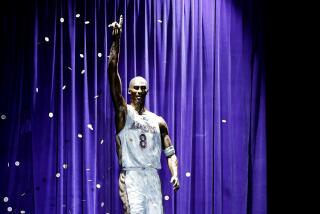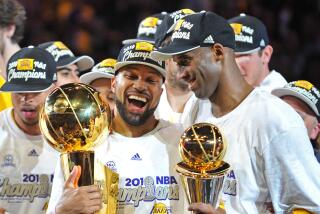‘Did you hear?’ The public grieves for Kobe Bryant, from Trader Joe’s to Staples Center

Fans gathered in front of the Staples Center to mourn the death of Kobe Bryant.
- Share via
“Did you hear?” one cashier at the Trader Joe’s on La Brea Avenue and 3rd Street said quietly to another staffer as he passed by.
“Yeah, but is it for real?” the other man replied.
“Yeah, just confirmed. Unbelievable.”
As smartphones pinged with news alerts and rang with calls announcing Kobe Bryant’s death, the normal hum and activity of the busy grocery store slowed nearly to a halt as shoppers stood in the aisles staring at their phones. Some exchanged heavy looks with one another.
“Brutal,” one said to himself.
“He was the best,” another said as he passed by.
It was that kind of day across Los Angeles as the city mourned publicly and emotionally for one of basketball’s greats, killed in a helicopter crash Sunday morning along with his daughter and seven others.
At L.A. Live, where Bryant played for years, fans were stunned.
“It made me sick, absolutely sick,” said Kyle Robinson, 28, a lifelong Laker fan.
“I knew there would be a nice crowd down here, and it’d be a place to come talk about it and hang with other fans that are hurting too,” Robinson said.
“Initially, you’re like, ‘It’s not true,’ ” he added. “Now that its real, it sucks. He was a legend in this city. He taught us that, with hard work, you can be the best at anything. All those videos showing him in the gym, late nights, it was empowering, it was inspiring.”
Ryan Apfel, a USC student from Redondo Beach who played high school basketball, said: “I was at my apartment by myself and I broke down crying. I looked for my Kobe jersey and said, ‘I have to go down there. I’m too restless. I have to pay my respects.’
“Growing up in L.A., it’s such a big, diverse, spread-out city,” Apfel said. “One of the things that I realized growing up here that brought us together was the Lakers and Kobe. I think part of that was because of the way he approached the game. I think a lot of people grew up with Kobe as their mentor from afar. It’s not just about basketball. It’s been about how you approach life in general. A lot of people from L.A. take that to heart. Even after he retired, this is a Kobe town.”
The mood was the same in Orange County, where Bryant lived.
Leslie Agan, 38, still has in her safe a carry-out tray signed “Kobe 8” that he autographed for her in 2000 when she was a cashier at the AMC 30 theater in Orange.
“I saw him just about every weekend at my first job, and he was always extremely kind and considerate,” she said. “The death of Kobe Bryant feels exactly like losing a childhood friend. There will never be another.”
The Lakers have always had a huge Korean American fan base — a following that grew when the team became the first in the NBA to broadcast in Korean in 2013.
That was the year when Time Warner Cable, which invested nearly $3 billion for regional TV rights to Lakers games for the next two decades, hired five Korean Americans as play-by-play announcers and color commentators, prompting crowds to swarm karaoke bars and restaurants to catch Kobe in action — and to immerse themselves in learning more about the sport with the help, and intimacy, of their native language.
“He’s one of these athletes that transcend race and nationality — I’ve been following him since he graduated from high school and went straight to the NBA,” recalled Alex Kim, 47, a public relations executive. “The fact that the team participated in outreach to our community only made them more popular. It showed that they and the business decision-makers really support fans from all cultures.”
Kim, who divides his time between Newport Beach, where Kobe made his home, and Los Angeles, said multiple friends texted him news of the crash, which sent him rushing to social media. “This is like the day Michael Jackson, the king of pop, was all of a sudden gone, since [Bryant] is the king of basketball. Man, just wow, just shocked.”
Like many famous athletes, Kobe is known just by one name all over Asia. Kim says even his mother, who is not devoted to sports, and scores of his fellow immigrants who do not monitor on-the-court activities know the legend. “We mourn through technology,” he added. “This way, we share our grief locally and globally.”
More to Read
Sign up for Essential California
The most important California stories and recommendations in your inbox every morning.
You may occasionally receive promotional content from the Los Angeles Times.













